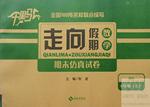题目内容
Today cellphone have become ______ part of our busy life. Besides communication, we also use them for ______pleasure.
A. the ; / B. / ; / C. a ; a D. / ; a
B

 千里马走向假期期末仿真试卷寒假系列答案
千里马走向假期期末仿真试卷寒假系列答案It’s Friday morning in the year 2030, and you’re running late. You got carried away watching the music video that was playing in the corner of your bathroom mirror while you were brushing your teeth. How will you get to your office at Mega Giga Industries on time?
A quick check of your Internet–connected refrigerator tells you your train is a bit behind schedule, too. So you decide to drive your environmentally–friendly fuel cell car instead—or rather, let your car drive you. It’s programmed to know the way and it will get you there without speeding, getting lost, or crashing.
Settling into your office chair, which changes color to match what you’re wearing, you pick up yesterday morning’s newspaper. Printed on reusable electronic paper, it immediately rewrites itself with today’s headlines. Now it’s time for your big meeting. Uh-oh! You’ve left your handwritten notes at home. No problem. The digital ink pen you used has stored an electronic copy of what you wrote.
Your wristwatch videophone (可视电话) suddenly rings. Your best friend’s face pops up on the screen (屏幕) asking what you’re doing this weekend. Will you play virtual soccer with the U.S. Olympic team? No, no. Your friend says, so you have to take the new elevator (made of microscopic fibers many times stronger than steel) 60000 miles into space.
Could this scene really take place in just twenty years? The researchers who are now developing all this stuff think so. These gadgets (小器械) may be as common in 20 years as cell phones and DVD players are today.
What is the BEST TITLE for the passage?
| A. Life in the Future | B. Future Transportation |
| C. Life Today and Tomorrow | D. Development of the Internet |
Your future car has all of the following features (特点) EXCEPT .
| A. being programmed to know the way | B. using environmentally-friendly fuel |
| C. driving you to different places safely | D. having an Internet-connected refrigerator |
How many high-tech products are mentioned in Paragraph 3?
| A. Two. | B. Three. | C. Four. | D. Five. |
We can learn from the passage that in twenty years .
A. going to space may be common
B. DVD players will be much more popular
C. playing virtual soccer with Olympic teams won’t be attractive
D. wristwatch videophones will completely take the place of cell phones
Electronic waste, or e-waste, refers to electronic products that are no longer usable. This can include TVs, cell phones and computers and other office electronics, electronic toys and videos machines. Today, the average turnover(更换)rate for a computer in the United States is every two years, according to the environmental group, Greenpeace.
The group's Dai Yun says e-waste is a global problem. "The electronic industry is one of the fastest growing industries in the world. The high speed of growth in this industry means more and more electronic products are being wasted and thrown away. If no one decides to retrieve the old products and process them properly, the electronic waste will sweep over the earth like the huge wave behind me and pollute the Earth seriously."
Greenpeace works out that 20 to 50 million tons of e-waste are produced globally each year. The components(部件)in many electronic products contain harmful chemicals that pollute ground water and the environment.
At present , the U.S. has no federal law for the disposal (处理) of e-waste although a few states have e-waste recycling programs in place, but there is no law. The U.S. exports much of its e-waste to third world countries, such as India and China, where workers took apart computers for valuable parts, hoping to sell them for money. But harmful wastes expert, Dr. Bakul Rao, says that's a dangerous practice. "From now on, the recyclers are not very educated. All they know is they can retrieve copper or gold out of it. So, the easiest way to do that is leach (过滤) it out in an acid or burn it off to retrieve it. So, that's where they don't know how to deal with it, neither do they have any health systems in place. So, their exposure is more."
1.What does the underlined word "retrieve" (paragraph 2) probably mean?
|
A.look into |
B.take apart |
C.get back |
D.throw away |
2.What of the following statements is true according to the passage?
|
A.The U.S. has strict national laws for dealing with e-waste. |
|
B.Third world countries import e-waste to get valuable parts, which is a safe and easy way to make money. |
|
C.The way uneducated workers deal with old computers does great harm to the environment as well as to their own health. |
|
D.More and more electronic waste is being wasted and thrown away mainly because of people's bad habits. |
3. What is the purpose of writing the passage?
|
A.To attract more people's attention to e-waste. |
|
B.To call on people not to throw away e-waste anywhere. |
|
C.To tell people what e-waste is and how to deal with it well. |
|
D.To warn people to break away from the electronic industry. |
4.The next paragraph probably concerns ___.
|
A.how to deal with e-waste properly |
|
B.how to protect ourselves from harm by e-waste |
|
C.How to slow down the development in the electronic industry |
|
D.how to make full use of e-waste |